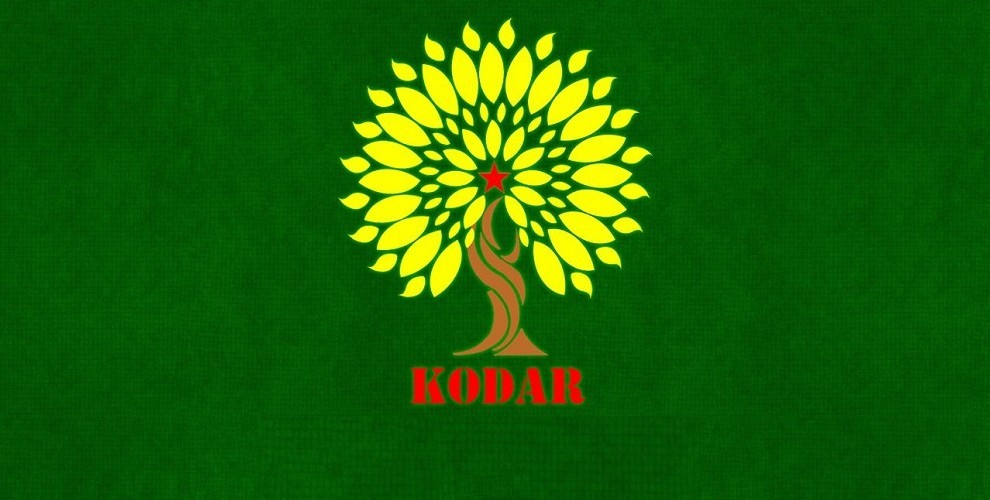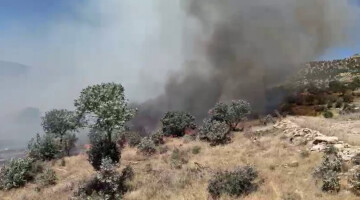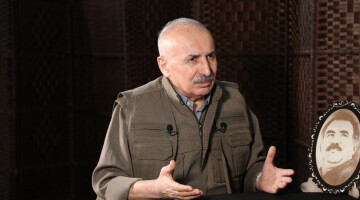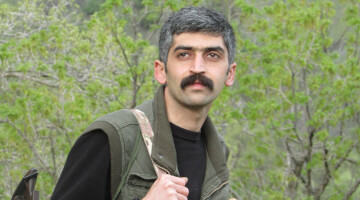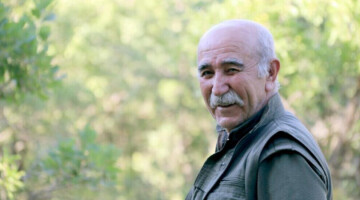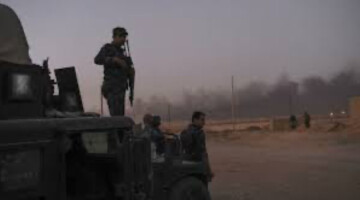The Free And Democratic Society Of East Kurdistan (KODAR) has presented a Road Map for the democratization of Iran and solution to the Kurdish question before the Presidential election scheduled to be held in Iran on May 19.
KODAR stated that they evaluate this "Road MAP" as a basic version that is able to be completed, corrected, or precised, saying: “In this context, the participation of all segments of society, intellectuals, women and youth to more enrichment of this road map, is useful and necessary.”
KODAR warned that if the government and the authorities do not have desire, willingness or ability to enter the period of "democratic solution", the speed of movement of the disaster and the explosion of political, economic and social crisis, will be multiplied. Accordingly, not taking steps toward accordance with the "democratic transition' is meant to invite foreign forces to interfere in Iran.
“If we add the multi-layered and multi-dimensional internal contradictions to this equation, a shadow similar to the current Syrian situation, also will be weighting over Iran. Thus obviously it can be declared that Iran is in risk of collapse, war, disaster”, said KODAR.
The full text of the Road Map prepared by the Free And Democratic Society Of East Kurdistan is as follows:
The Theoretical Review
The Iranian society remains in such a situation that the continuation of the current conditions is not only painful and tragic for the majority of people, but also is going to become extremely costly for the ruling forces increasingly. On the one hand, domestic crises, problems and gaps; on the other hand, foreign alignments, together have created a situation, that makes complicated and even impossible, for both ruling power, and some of the progressive forces to practice politics in the old method and style, or only by relying on the present assets. A necessary condition for the transition from the current political, legal, social and economic deadlocks, is the straight criticism of mentality and political deviation of the past and the current approaches. Beside this necessity, the correcting of deviations in favor of radical and democratic transformation is vital.
This transformation is a multipurpose measure. Other than being based on the creation of a "democratic model" according to the past needs and current realities, it also creates a deterrence against foreign interventions; and beyond both of these, it provides the possibility of breathing, coexistence, equality and the maximum satisfaction. And it is a change that can be evaluated as a magnificent "Historical Leap" in the event of exit of the closed and unlucky tyranny circle, totalitarianism, narrow-mindedness and exclusiveness. The phenomenon and monsters that are sucking the blood of the peoples, women, religion, and other progressives, doesn't satisfy them; so they are going to swallow the whole Iranian society.
The main question is, what forces show their resistance against this "democratic leap"? Forces that want the maximum benefits for a small radii and closest layers to them. Exactly for that reason, this openness and democratization in an urgent need. Because it demands the maximum legal, political and economic benefits, for all variations in a large scale. This condition can be likened to reclaiming and sharing a house, which has been under the siege, by limited forces; forces that the "democratic transition" can put their micro and macro rente at risk. At the same time, the continuation of their rent-seeking puts the existence of all people, diversity, and even the existence of that confiscated shared house at risk.
The current catastrophic and venture situation is the result of a destructive intelligence, and devoid of conscience. For this reason, finding each other, convergence and the unity of the solver and Conscientious Intelligences, is a a basic precondition for a democratic transformation.
In the meantime, the unclear point is this: do the centers of power have enough capacity, talent, wisdom and smartness to correct the current deviations? If we judge only by analyzing the previous trends and current ideas, any sign that indicates a different and positive preparation can't bee seen.Thus, the presidential election is a test for the authority to redefine its angle with democratization and its distance from the solution process. The political wisdom dictates that at this point, a way of thinking should take the executive management, that changing of the current situation in favor of providing freedom, equality and democracy is its priority, other than protecting and handling of the current conditions.
Necessities:
At the moment, only in one condition there is a possibility of balancing, maximum accommodating and the equivalence of the will of society, government and sovereignty with each other; that is: the government has to be ready, along with the progressives, with a strategic approach, to perform its responsibilities, in democratization of politics, law and community. A situation which can be evaluated as "to withdraw small interests, in favor of the common good".
Obviously, it would also require "confession of the crisis existence", acceptance of responsibility for the democratic transition of the crisis and guarantee individual and collective rights and freedoms of all sectors of society and among the peoples of Kurdistan and Iran.
No change is possible, without "changing the current constitution", and without the guarantee of the rights of all entities whose rights are not included in this current constitution. The constitution can not only include one religion, ethnicity, one language, or only men; and can't define other diversities, out of its law frame.
Such a condition will open the way, to other appalling and systematic religious, ethnic, linguistic or gender discrimination. On the other hand, this discrimination would generate other injustices, such as economic, cultural and social discrimination. A situation that imposes multiple suffering, uneven development and several cancer tumors to life and spirit of the community and even to the authority. The current and existent status is proof of this proposition.
A mission that constitution should take is to explicitly define Iran as a common land of all peoples, genders, religions and identities. The constitution should respect diversities, guarantee their rights, and create such a spirit, that the "democratic nation" gets formed through its ventricle of free and fair coexistence of its peoples. The thesis that is apposite of Reza Khani's approach, and instead of weakening and melting down of variations, into a single identity، which is the driving of divergence, tries to protect the existence, rights and freedoms of individual and collective diversity, to maintain and guarantee a equitable, democratic and free convergence. Without a doubt, this is the first step in correcting the deviation.
In the meantime, there are several critical points: First, only the democratization of constitution, by itself, is not meant to be a democratic transformation. A democratic constitution must define its own inforcement legeslatives. In addition, another important issue is that no will of religious, political and military should be able to choose their unilateral interpretation of the law and politics, to impose on the community. which is the greatest danger, that threatens democratization.
On the other hand, there, should be insistence on this point, that, the democratization of Iran, is not only the responsibility of the government. The main responsibility has to be taken by society, peoples, women and intellectuals. Theses that spend their energy, negatively or positively, on domination, without underlying and preparing of society, are not consider as a part of involved forces, in the democratization process. The necessity of participation and effectiveness in the democratic process, is to be social based. Forces that believe: The performing of all affairs, is the task and responsibility of the government and authority, has not understood the core of democracy, properly. and generally would be isolated, or going to be server of the authority, or perhaps become potential tyrants, eventually.
The society, can persuade the government, to the constitutional changes, only by organization, convergence around democratization and social pressure.Therefore it is necessary to be repeated that the society does not plead the government for change and reform; but by its presence, tracking and push, will materialize it. Intelligence requires that the government does not disrupt the process, or puts barrier on its way; but on the contrary, the authority has to accommodate itself to it, and tries to adapt to the people's raised demands. So it is not the society that will submits to the logic of the state; but the state has to decrease its angle with the society, and its will toward democracy, in order for a "democratic synthesis", to be created.
From this perspective, the developments seem that presidential elections, unlike ever, can be an opportunity, a window to enter the era of democratization. Frstsvzy sovereignty and the forces involved in the election on this link, a strategic mistake and would be disastrous. Missing of the opportunities, by the government or by the forces involved in the election, in this link, can be an strategic and disastrous mistake.
Both of the authority and the forces that will be present in the election scene, if do not act in the framework of the "democratic solution", either will not be able to bring people to the poll, easily, nor be able to determine the post-election processes. Only by engineering or creating the dichotomy of "bad" and "worse" for the society, can not go to meeting the future developments. Any instrumental, tactical, reductive and disingenuous approach, toward elections, can incredibly accelerate the activation of potential catastrophes.
Suggestions:
In order for democratic solution to the Iranian issues, in different fields, several commissions have to be formed:
1) The Legal Commission:
The Commission will pursue several goals: on the one hand, the debate about the flaws in the current constitution and the general level of follow-up meetings and conferences of legal experts, in order to arrange a pathological constitution. In addition, the Commission should investigate Grounds of discrimination and violation of individual and collective rights, and study and research about how to change the current constitution to such a democratic constitution, that guarantee civil rights, political and civil rights of peoples, religions, women and other diversities. The composition of the commission would be composed of pro-democracy lawyers, legislators and representatives of social variations. In the meantime, government representatives can also participate in the committee and express their views. The ultimate goal of the commission, is the preparation of civil society and the rule of law, to change the constitution and alignment with "era of the democratic politics".
2) -The commission for redefinition of management structures:
One of the preconditions for the transition to democracy in Iran, is passing through the logic and model of margin and central management. as well as decentralization of the power structure. The commission redefine the urban, regional and state management, in some way, that the collective will in each of these units, has priority to the political preference of the power centers. Opposition to the autonomy of society, is in the sense of distrust of local forces and insisting on the authoritarian approaches. The use of democratic capacities of local administrative, political, economic, cultural and security managements, is a manifestation of self-confidence and political health of a community.
The Commission also may be in documentary form, discuss these axis, and search a solution to them: The political and economic destruction, as the result of centralized political - administrative, the political consequences of "maximized deployment of non-local forces", in the urban and regional management, the quality of performing more active roll, and the direct impact of society on decision making process, and in the social - political life.
The commission, eventually thinks of different mechanisms to empower the community, and the Miniaturization of the government.
3) - The Commission of equitable coexistence of peoples:
The purpose of this Commission is further integration, free and democratic unity between the peoples of Iran. Totalitarian ethnic - linguistic, is a threat to the coexistence of social variations. Not aggressive nationalism and defensive nationalism, none were able to make significant changes in favor of equality, unity and coexistence. The commission can concentrate on topics such: what kind of forces benefit from the existence of differences, conflicts or tense atmosphere among peoples, by holding the thematic conferences and meetings, and what kind of responsibilities have to be taken by the society, intellectuals, government and the authority, for the integration and consolidation of relations between the peoples of Iran.
4) The Women's Commission:
The framework of this commission is to investigate the barriers on the way of removing discrimination against women in legal, political, economic, and management areas. Discrimination against women in Iran has two layers: it is partially the result of the institutionalization of patriarchal mentalities in society and its supplements, the existence of discriminatory laws, and anti-woman interpretation of them. Without the guarantee of women's right, democracy, equality, and a healthy and magnificent social and political life can not be existed. Elimination of discrimination against women is the precondition for transition to democracy in Iran. The special function of women's commission is to maximize the utilization of existing capacities, and design and suggesting of new political and social capacities to ensure women's rights and freedoms.
5) The Security Commission:
The purpose of this commission is to debate and decision-making on security policies committed to the democratic will of the community. In a real democratic society, the military and security forces are a threat to not only the existence of the society, but also to protect the assets of a democratic society and deterrence of security, by relying on the spirit of solidarity, empathy and convergence of all diversity of society, should be considered as the most important mission of security forces. Purpose of this commission is to find mechanisms to establish maximum social security and implementation approaches and security policies in a spirit of "democratic politics".
6) The Economic Commission:
On the one hand, relying on the 'Oil Economy", and from the other hand, unbalanced economic development, which is the result of legal and political discrimination, would open the way to unemployment, poverty, and social crisis. The economic development, without the development of democratization, will be unstable, temporary, and vulnerable. Functioning of the Economic Commission, could examine how fair distribution of wealth and resources of the country is, relying on community-based economy.
7) The Environmental Commission:
Industrialism and monopoly profits have created massive environmental destruction. This destruction, catastrophically, threatens the society and the possibility of social life. Air pollution, desertification, and water shortages, excessive building of dams, forest fires are only a part of the Manifestation effects of the disaster. Environmental Commission will attempt to state social responsibility and ethical approaches to the environment and apply to highlight mentality and functional aspects of the "democratic ecological paradigm".
8) The Commission of language and culture:
The freedom of diverse cultural identities in a country indicates the level of democracy and progress of the country. Protection, preservation and development of languages, Kurdish, Azeri, Arabic, Balochi and other languages in the Iranian region at all levels and in addition to Persian, will lead to more enrichment of the Iranian society. In this regard, the Commission can investigate the mechanisms to teach mother tongue. Learning of the native language, in unquestionable right. that the society and the government, has to find appropriate formulas to make it happen. Besides the language issue, identify and attempt to control the dangers that threaten the existence of cultural communities and peoples of Iran, is a vital activity.
Opportunities;
If the government and the authority, are ready to prioritize the democratic opening, and meet their responsibilities, toward the democratization of law and politic, including giving appropriate responses to the suggestions explained in this "road map", KODAR and the democratic mechanisms and a lot of forces that seeking fundamental changes, both inside and outside of the country, will perform their duties. Naturally, this situation, is the wisest state, to transit from accumulated internal crises. At the same time, the era of "democratic politics", can be considered as a historical exit of the closed circle of monopolization, totalitarianism and authoritarianism. This circumstance, will convert the energies which being used to neutralize each other's abilities, into energies that aligned with each other. Also it'll change the scattered and conflicting wills, into unified, free, empowered, and at the same time, democratic wills.
Threats:
If the government and the authorities do not have desire, willingness or ability to enter the period of "democratic solution", the speed of movement of the disaster and the explosion of political, economic and social crisis, will be multiplied. The regional and trans regional intervention forces are well aware of that, the Achilles Heel of Iranian authority is the issues of democratization, peoples and women's rights. Not taking steps toward accordance with the "democratic transition' is meant to invite foreign forces to interfere in Iran. If we add the multi-layered and multi-dimensional internal contradictions to this equation, a shadow similar to the current Syrian situation also will be weighting over Iran. Thus obviously it can be declared that Iran is in risk of collapse, war, disaster. A situation facing it, by using the current capacities, is almost impossible. Moreover, also the conflict between the people and the government can encourage and persuade part of people, or part of forces to align with the coalitions that have been formed against the government.
The position of KODAR about the presidential elections:
The Free And Democratic Society Of East Kurdistan, KODAR, soon will publish a declaration, containing the needs of the era, and the specific demands of politic and legal. KODAR will announce its final position about the presidential election in next weeks and after evaluating of probable reactions of candidates and the authority, to the declaration, demands, and the suggested commissions. In case of the observation of symptoms indicating the readiness of the government for a democratic opening, KODAR can have a positive position. On the contrary, if the government is not ready to show a "different political behavior", KODAR will not participate in any non-democratic process under any circumstances.
The position of KODAR about the local councils:
About the election of local councils, KODAR believes that the election of the competent and democratic to take over the management of urban and rural, is a basic necessity. The experience of the past years, has shown that the local councils, rather than being a place for participation of the public in the local management, have become a place for nepotism, favoritism, administrative corruption, land invasion. Exactly for this reason, people have to reclaim this territory from opportunists, and elect individuals who don't have corruption background, carefully and sensitively. Society should not rely only on electing individuals, but also to monitor their performance and keep them accountable is vital.
Conclusion:
The Free And Democratic Society Of East Kurdistan, KODAR, with an emphasis on the raised necessities and suggestions, considers the democratic solution to the Kurdish problem, also the question of rights and freedoms of women, religions, and ethnics, as the most urgent priorities of this period. KODAR believes that, in this critical conditions, which the shadow of foreign intervention is weighting on Iran, the authority has to, without wasting the time and strategically, provide the necessary conditions for a transition to a democratic state. KODAR relying on a strategy of the "third line", does not consider the foreign intervention as transformational, nor does it regard the persistence of dictatorship and totalitarianism as wisely and intelligently. For transition to democracy, all organizations of civil society, all segments of society, political parties, political elites, intellectuals, women and youth should get involved in strengthening of their resolution mechanisms and play their role in it; mechanisms that base on the democratization of "politics, law and constitution", and alignment of the authority with the democratic paradigm, the preparation of the society for the "era of democratic politic", and development of the management models - local democracy. Obviously, lack of alignment of the authority with this paradigm, or creating barriers for democratic processes will drive KODAR and the society toward other procedures. Inclusive social and political pressures will be only one of its axis. Developments absolutely will not be in favor of the mentality that wishes for the continuation of the current status. In this context, KODAR will formulate and categorize its democratic demands via the declaration it will release in next days. The aim of the publication of this notice is to assess the readiness of the government for making changes, and to accurately depict the demands of the Kurds and other peoples of Iran. It is obvious that the way of respond or reaction of the authority to this declaration can considerably enlighten the road ahead for the public opinion of Kurdistan and Iran entirely.
KODAR evaluates this "Road MAP" as a basic version that is able to be completed, corrected, or precised. In this context, the participation of all segments of society, intellectuals, women and youth to more enrichment of this road map, is useful and necessary.

